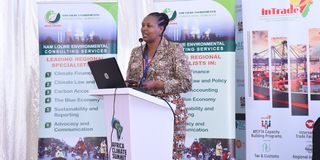Premium
Create energy fund to finance green growth, African leaders urged

Ms Emily Mburu-Ndoria, Director of Trade in Services, Investment, Intellectual Property Rights and Digital Trade, African Continental Free Trade Area (AfCFTA) Secretariat, giving the opening remarks at the session on "Leveraging the African Continental Free Trade Area to promote green investment and sustainable trade in Africa".
African leaders have been urged to set up an energy fund to finance the continent's green growth projects in order to wean themselves off over-dependence on external parties.
Ms Emily Mburu-Ndoria, Director of Trade in Services, Investment, Intellectual Property Rights and Digital Trade at the African Continental Free Trade Area (AfCFTA) Secretariat, said trade, industrialisation and climate change are deeply interlinked and investing in climate resilient infrastructure is critical and a big step towards sustainability.
She explained that renewable energy and clean technologies are important for sustainable development.
According to Ms Mburu-Ndoria, Africa should also look at clean transport as it goes hand in hand with trade and green growth strategies.
“As Africa, we ought to push for an interconnected carbon exchange and carbon market within Africa,” Mrs Mburu-Ndoria said.
She was speaking during a high-level panel at the just concluded Africa Climate Summit organised by Intrade Africa in partnership with the Kenya Private Sector Alliance (Kepsa) and Nam Lolwe Environmental Consultants.
The panel was moderated by Ms Jacinta Kiruthi, chief executive officer of Intrade Africa.
United Nations Development Program (UNDP) Carbon Market Development expert, Mr Robert Ondhowe said Africa has enough natural and material resources; and human capital –in terms of knowledge systems, skills base and know-how to set up its own African energy fund.
He supported the role played by AfCFTA acknowledging the importance of Africa’s necessity to open up its regional borders, reduce protectionism, facilitate cooperation and regional pooling.
“Africa is capable of funding itself and it doesn’t need to rely on external parties and we welcome the proposal for an African energy fund,” said Mr Ondhowe.
He also underscored the importance of the role of the private sector in climate conversation stating: “The private sector in Africa is not involved in the discussions around climate change and this is sad because it means we have gaps that are costly to our economy."
United Arab Emirates Trade Center chief executive officer Mr Walid Hareb Al Falahi said Africa presents numerous opportunities for investors to tap into, however, the mechanisms with which to fund and channel the funds are still blurred.
He observed that the big issue the continent is grappling with in regard to climate change is finance.
Consequently, he proposed an African energy fund to be set up to fund bankable projects in the energy sector of the continent.
"Africa should work on different tools to fund themselves in matters of climate change. There is enough money, opportunities and expertise in Africa to be able to tap into all the opportunities. There is just a dire need for re-organisation," said Mr Falahi.
Kepsa Trade and Industry Sector Board member, Ms Wangari Muikia called for African countries to diversify their economies away from resource-reliant livelihoods in order not to put undue pressure on the environment.
She noted that several economies in the continent are natural resource-dependent, resources which are impacted by climate change and/or are climate-negative.
"There is a need for energy mix if we are to do better and in order to take up the latest technologies opportunities and move into the so as to improve efficiency."
For his part, Nabih Al Nahdi, a United Arab Emirates businessman, underlined the need for Africa to have its own credit scoring systems using their own financial organisations in order to reduce the cost of borrowing due to the perception of high risk.
He also noted that AfCFTA is well positioned to support Africa with trade facilitation on carbon markets.





